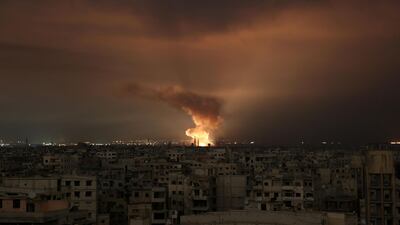The powers “guaranteeing” the ceasefire in Syria have been reduced to accomplices in the extermination campaign taking place in Eastern Ghouta in the south. In the north, in Afrin, those who thought they could settle the battle quickly have fallen victim to their arrogance. Russia lost the restraint it had shown earlier. Iran’s pretences have been laid bare by the carnage in Syria. Turkey seems to have struck a deal to turn a blind eye to Ghouta in return for “victory” in Afrin. These three guarantor states are now being accused by the international stakeholders of abandoning a political solution in Syria.
Four whole days had to pass before the world started waking up to the hell unleashed on those in Ghouta, with the images of bodies making their way into the media like a tableau from a bygone savage era. UN chief Antonio Guterres called for an end to the madness, which he said has turned Ghouta into a “hell on Earth”, urging an end to hostilities so that the sick and wounded “can be immediately evacuated and humanitarian aid deliveries can reach those in need”. His special envoy, Staffan de Mistura, characterised Ghouta as a second Aleppo, in reference to the siege and destruction of that city before it fell in 2016. Zeid bin Ra’ad, the UN Human Rights High Commissioner, called for an end to the “monstrous campaign of annihilation”. And poignantly, Geert Cappelaere, Unicef’s Middle East and North Africa regional director, said “No words will do justice to the children killed, their mothers, their fathers and their loved ones” in Ghouta.
In the West, Germany held Russia and Iran responsible for the massacre. A spokesperson for the German chancellor said: “One has to ask where is Russia, where is Iran, which had pledged in Astana to guarantee a ceasefire also in eastern Ghouta … Without the support of these two allies, Assad’s regime would not be where it is today.” Germany called on the Syrian regime to stop the massacre in Ghouta and allow humanitarian aid in, urging Moscow and Tehran top put pressure on Damascus to this end. France too appealed to Russia and Iran to impose a ceasefire in eastern Ghouta. For its part, the United States called for an end to the bombardment, with a spokesperson for the state department saying “Russia bears a unique responsibility for what is taking place there”.
Russia’s reaction was remarkable. Moscow denied US accusations, with Kremlin spokesperson describing them as “unfounded”. At the Security Council, the Russians were quick to pre-empt a motion by Sweden and Kuwait for a resolution on a 30-day ceasefire in Ghouta, and asked for an urgent session to allow all sides to present their understanding of the situation.
Russian obstruction was aimed at preventing the Security Council from condemning the Syrian regime’s actions and blaming Russia and Iran, as well as blocking a resolution that could halt the military momentum in Eastern Ghouta seeking to end rebel presence there, with Tehran’s support and Moscow’s blessing.
Practically speaking, what is happening is the collapse of the guarantors of the ceasefire in Ghouta, one of the de-escalation zones agreed by Russia, Iran, and Turkey. Ramzy Ezzeldin Ramzy, the Deputy Special Envoy of the Secretary-General of the UN for Syria, conveyed the body’s concerns for the political process being co-ordinated with the Russians, with the Astana track in extreme jeopardy following the escalation in Ghouta.
Yet Russia’s protestations of US double standards on humanitarian issues came with an attempt to reach some kind of exit in collaboration with regional powers led by Egypt. Indeed, Cairo has become effectively the fourth guarantor in Eastern Ghouta itself, where it had helped Russia conclude truce agreements. Egypt’s foreign ministry issued a statement calling for a truce to bring in aid and evacuate the wounded.
_____________________
Read more from Opinion:
Eastern Ghouta: the guilty parties have a terrible account to settle
After successive UK charity scandals, who guards the moral guardians?
Saudi Arabia's opera house opens up a host of possibilities
_____________________
Egypt sees the violent escalation in Ghouta as a blow to its efforts there. Cairo believes it has a distinguished role different from Turkey and does not mind helping Moscow find an exit amid growing pressures on Russia. According to reports, some high-level co-ordination is taking place between Egypt and Russia, partially based on using the latter’s influence on the Syrian regime and Iran, in tandem with Egypt’s influence on the so-called Cairo Group of Syrian opposition factions.
But the final form of any such de-escalation will not be easy to reach. Moscow is determined to eliminate all armed groups in eastern Ghouta, having for long called on them to disarm voluntarily.
Today, the Russians believe negotiations to reach a peaceful outcome in Ghouta are a dead end, as hinted at by the Reconciliation Centre in Russia’s airbase in Hmeimim. There may be no other option but to repeat the Aleppo outcome in Ghouta, in the Russian eyes.
Moscow however is aware that the collapse of the Astana process is now a strong possibility, which would serve US long-term goals amid continued Russian-American tensions. But the Russian diplomacy will continue to attempt to walk a tightrope: it needs Egypt’s help as a guarantor in Syria’s south, is cutting deals with the second guarantor Turkey in the north, and is defending Iran’s role as a guarantor far and wide.
Not long ago, Russia seemed confident, in control of Syria’s political, military, and economic keys, and ready to distribute shares and reconstruction contracts, based on its belief the war had been settled in its favour.
Today, Russia appears anxious, confused and distracted. The Russians had thought that having a shared enemy with the Americans was enough to achieve a qualitative shift in their relations. “We’ve discovered that this assumption was wrong … and the shared enemy – ISIL – is no longer there,” said one Russian source.


